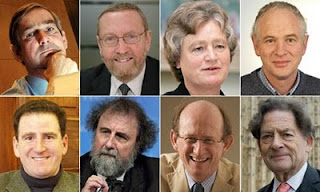Witnesses due to appear before the select committee, clockwise, from top left: Richard Thomas, Professor John Beddington, Professor Julia Slingo, Professor Phil Jones, Lord Lawson of Blaby, Professor Edward Acton, Professor Bob Watson and Dr Benny Peiser. Photograph: guardian.co.uk
The climate scientist at the centre of a media storm over private emails released on to the internet will face his first public questions on the affair today when he appears before a parliamentary committee.
The science and technology select committee is expected to ask Phil Jones, head of the Climatic Research Unit (CRU) at the University of East Anglia, to explain emails that critics claim show he manipulated data and censored research.
It will be the first time Jones has appeared in public since the emails were released in November. He will also be asked about correspondence that appears to show a reluctance to share data with critics under Freedom of Information requests.
Jones is among several witnesses called to give evidence today on the affair. Others include Bob Watson, chief scientist at the environment department Defra, John Beddington, chief scientist to the government, and Julia Slingo, chief scientist at the Met Office.
Prominent climate sceptics Nigel Lawson and Benny Peiser, of the Global Warming Policy Foundation, will also appear, alongside Richard Thomas, the former Information Commissioner, and Sir Muir Russell, who heads a separate inquiry into the emails that was set up by the university.
The university's submission to the inquiry said it "strongly rejected" accusations that it had manipulated or selected figures to exaggerate global warming. And it denied suggestions that it had breached Freedom of Information rules by refusing to release raw data.
According to the submission, allegations that scientists hid flaws and research findings were the result of misunderstandings of technical jargon or statistical analysis. It said the often-cited email that refers to a "trick" to "hide the decline" in a discussion of temperature measurements had been "richly misinterpreted and quoted out of context". Read more.

No comments:
Post a Comment